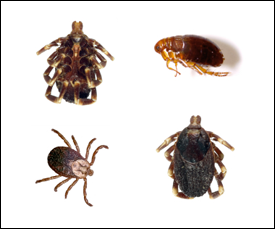Flying Insects
Fabric Pests
Rodents
Ticks & Fleas
 Flea pest control and flea removal services in NJ can be a real problem. Once fleas have entered your home, it can be a very lengthy removal process. Pest-Gone, LLC technicians are highly trained for flea pest control services in NJ. As your flea pest control exterminators in NJ, we provide a thorough inspection and flea removal services for the interior and exterior of your home.
Flea pest control and flea removal services in NJ can be a real problem. Once fleas have entered your home, it can be a very lengthy removal process. Pest-Gone, LLC technicians are highly trained for flea pest control services in NJ. As your flea pest control exterminators in NJ, we provide a thorough inspection and flea removal services for the interior and exterior of your home.
Fleas can enter your home in many ways, even if your pet is not or rarely goes outside. They can hop in from your yard, hitch a ride on you, or even be left over from previous inhabitants. Flea eggs can be found on your pet and wherever your pets spend time. It is vital to call your local flea control service in NJ to prevent a flea problem turning into a flea infestation which could happen in the matter of days. If you suspect fleas have invaded your home, don't hesitate! Call Pest-Gone, LLC your flea pest control exterminators of NJ and speak to one of our highly trained flea control and flea removal consultants today.
Call Pest-Gone, LLC NJ Pest Control to speak to a Tick and Flea Control Professional today at 732-356-0024
“We Always Guarantee our Work”
Please read below to learn more about Ticks and Fleas:
Ticks are in the phylum of animals called Arthropoda (jointed appendage). This phylum of animals is the largest in the animal kingdom. There are over 850 different species of ticks, and they parasitize every class of terrestrial vertebrate animal, including amphibians.
Ticks are small rounded arachnids that cling to one spot and do not move. They have inserted their head under the skin and are engorging themselves on the blood. Diseases carried by ticks means that you should have yourself or your pets checked after you find ticks. On the one hand, ticks are a little easier to deal with since they remain outdoors, and do not infest houses the way fleas do; on the other hand, they carry more dangerous diseases and are harder to find.
Ticks don't typically infest houses, unless you have a pet that had an overlooked tick that dropped off and hatched its eggs. In the Northeast US and other temperate climates the tick Rhipicephalus sanguineus is almost exclusively limited to domestic habitats, particularly kennels. Becasue the entire life cycle occurs inside, control strategies become similar to that of controlling fleas. You will have to spray your house in this case as ticks hatch an unbelievable number of eggs. Your local hardware store can give you tips on what is best to spray with. You are not too likely to find "natural" or low-toxic sprays for ticks. On the other hand, one spraying is likely all you need to clear them out of your house. They are not tenacious the way fleas are.
Fleas can enter the home in many ways, even if your pet is not or only rarely allowed outside. They can hop in from your yard, hitch a ride on you, or even be left over from previous inhabitants (larvae can remain dormant for astonishingly long periods of time under a variety of conditions).
Conventional wisdom and older studies that studied rat fleas suggest that fleas spend only part of their time on your pet; this is not true. There are different varieties of fleas, and the primary flea infesting dogs and cats in North America and large areas of Europeis the cat flea (yes on dogs, too). This flee, not as well studied as the rat flea actually spends all of its adult life on the host under normal conditions. Eggs are laid on the host and drop off into the environment. Thus you can often find eggs wherever your pets spend time: on their bedding, through the house, in the backyard.
A good preventive method is to put down towels everywhere your pet normally lies and then wash those towels once a week. Deposited flea eggs are therefore cleaned out regularly. Regular vacuuming and emptying of the vacuum bag also helps, independently of any method or methods you choose to do, since that eliminates or reduces food sources for the larvae
